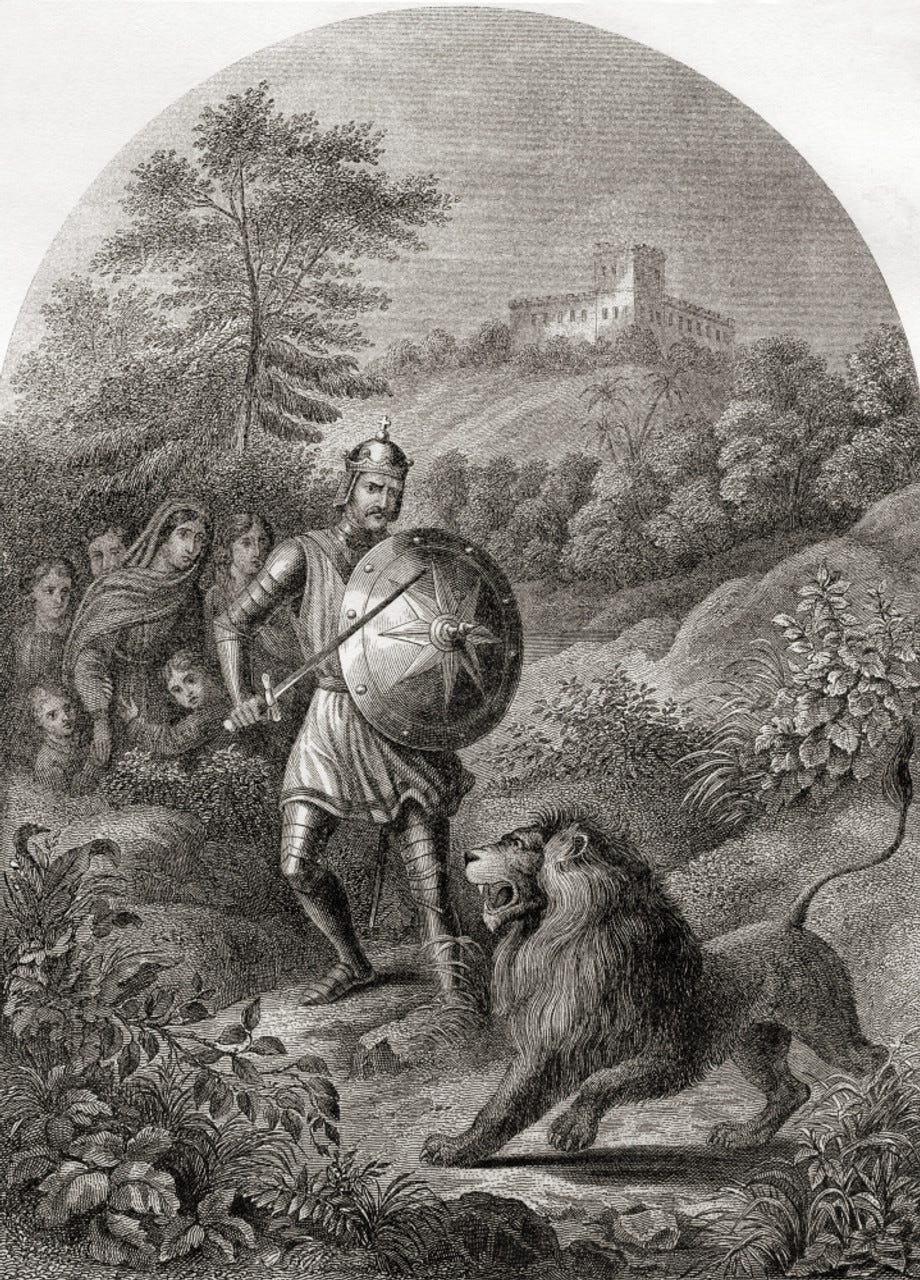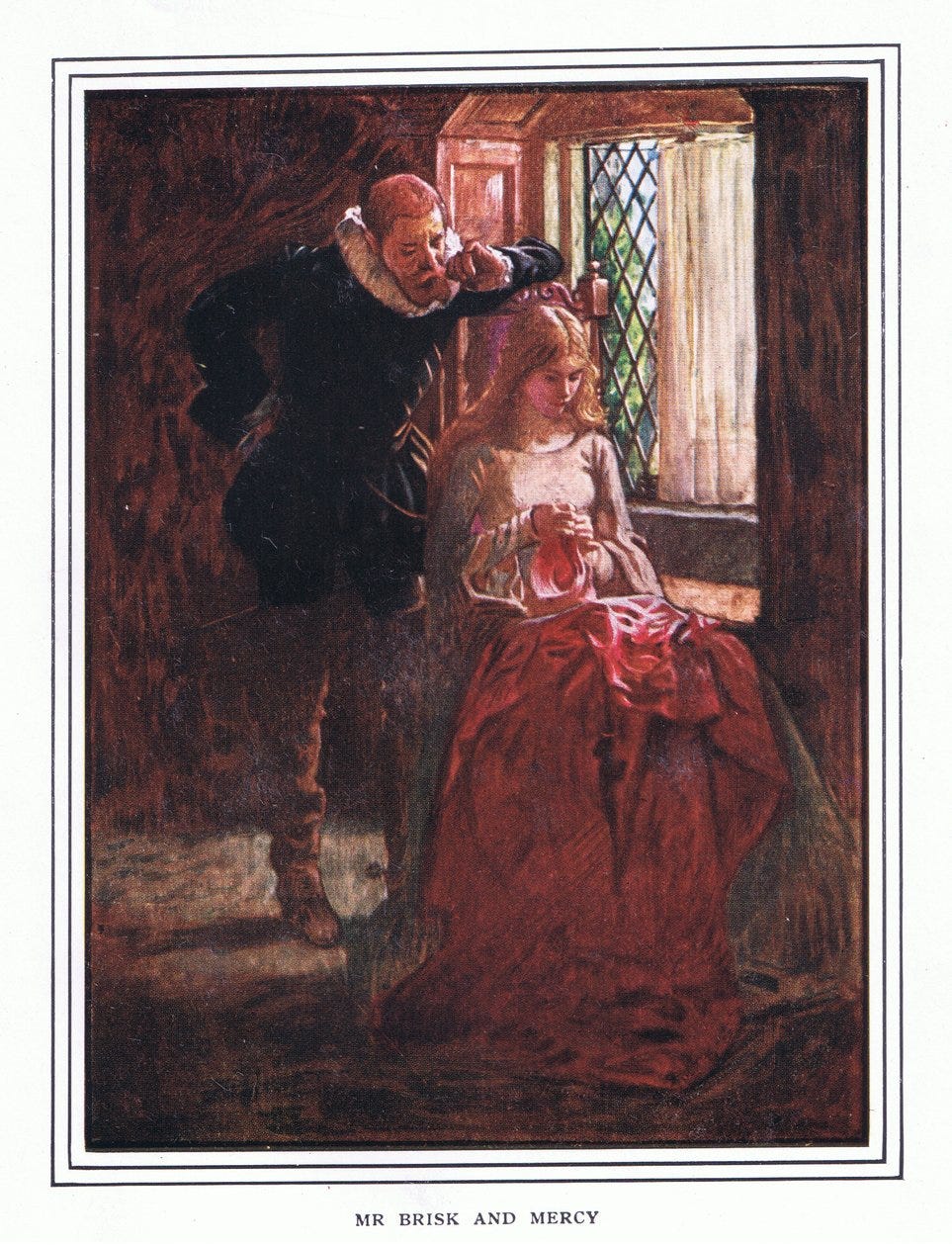
Are you a piper or a weeper?
Both—and a mixture of these personality traits—are faithful ways of being according to Great-heart as he describes to Christiana and her companions the long and arduous journey of Mr. Fearing on his pilgrimage to the Celestial City. Mr. Fearing so fears for his salvation, so fears any misstep or wrong turn or act of unfaithfulness that his progress is painfully slow, encumbered, and frustrated. On the one hand, excessive fear is unnecessary and unfruitful (or at least bears less fruit than might otherwise be yielded), yet Great-heart helps us see that such faithfulness is good and even godly. There are many ways to be faithful and many personalities in the faith. Great-heart explains that “the wise God will have it so; some must pipe, and some must weep.”
Now Mr. Fearing was one that played upon this bass. He and his fellows sound the sackbut, whose notes are more doleful than the notes of other music are; though, indeed, some say the bass is the ground of music. And, for my part, I care not at all for that profession which begins, not in heaviness of mind. The first string that the musician usually touches is the bass, when he intends to put all in tune. God also plays upon this string first, when He sets the soul in tune for Himself. Only here was the imperfection of Mr. Fearing: he could play upon no other music but this till toward his latter end.
Isn’t that beautiful? God doesn’t call us to be cookie-cutter Christians. He allows for our uniqueness—even wills it. Do not despair, you of low spirits. Do not overly restrain your soul, you freespirits. God loves you and made you the way you are. We all have disciplines to learn and apply. Yours are not mine, and mine are not yours, but the Lord wants to work in us all.
It’s been quite a few years since I last read Part 2 of The Pilgrim’s Progress. In rereading it now, particularly the section for this week’s post, I am reminded how much more I enjoy Part 2 than Part 1, in some ways. I’m sure this owes in part to the fact that (as I mentioned in a previous post) the greater realism in Part 2 offers a more novelistic literary experience. (For those who don’t know, the novel is both my great love and my area of academic expertise.)
To review, in broad strokes, the difference between Realism and Romance is the difference between variations of gray and black-and-white. Romance deals with ideal (good vs. bad, natural vs. supernatural, hero vs. villain) while Realism deals with more complicated characters and situations, and these more closely reflect real life where everything is a mixture of good and bad. Of course, these differences between Realism and Romance occur across a spectrum and, realistically speaking (ahem), no literature falls entirely or completely into either category.
Part 2 of The Pilgrim’s Progress falls just a little bit farther on the realism spectrum than Part 1, and first, I’ll focus on some of those elements.
The confrontation with Maull the Giant is perhaps among the most dramatic events in this section of the reading. A giant is, of course, a figure of Romance not Realism, but this character is more complicated than most villains of fantasy. Maull tries to present himself as a good guy. He uses “sophistry” (arguments, especially deceitful ones that seem convincing on the surface but ultimately don’t hold up closer scrutiny) to try to lure pilgrims away. In this instance, he accuses Great-heart of being the villain, falsely claiming that Great-heart kidnaps those under his care. A “maul” is a large hammer, and this character tries to hammer the faithful with false accusations and confusion. Such characters are all too prevalent in real life. I see such sophistry and false accusations in abundance from viral social media accounts run by self-identified Christians.
A most memorable, if brief, storyline within the journey involves Mr. Brisk who enters the scene at the Porter’s Lodge (where Christiana, her sons, and Mercie are staying) as a suitor of Mercie. (Bunyan’s gloss in the margin reads, “Mercie has a sweet heart.” I love that.) In a pure Romance, such a suitor would be a knight or a knave. Mr. Brisk ends up more of a knave because he is not truly devout and begrudges Mercie her life of service to the Lord and to the poor. Mr. Brisk would rather Mercie earn material riches than to store up riches in eternity. But Mercie does not get sentimental over love lost. “I will look no more oh him, for I purpose never to have a clog to my soul.”
Wow. You go, girl! Many women (and men) today might wisely heed this pre-marital advice. Better to have loved and lost than to have a clog to the soul. Indeed Mercie adds, “I might a’ had husbands afore now, tho I spake not of it to any; but they were such as did not like my Conditions, though never did any of them find fault with my person. So they and I could not agree.” What a strong woman Mercie is! She refuses to give up herself, her values, or her “conditions” simply to get married—even in a time when women had nearly no other options.
Again, I love Bunyan’s comment in the margin here. He says, “Mercie in the practice of Mercie rejected; While Mercie in the name of Mercie, is liked.” What a brilliant line that works literally and allegorically.
The realism of poor Mathew, Christiana’s eldest son, getting ill with the grippe (an old-fashioned word for the flu) after eating the fruit from Beelzebub’s orchard also works well allegorically. The word “grippe” comes from a French word for the flu but a word that also means “seize.” One gets “seized” with such an illness, so the connection makes sense. But Bunyan connects this meaning to the spiritual one by referring to this illness (the result of stealing and ingesting food from the enemy) as “Gripes of Conscience.” Further realism is provided in this passage with a bit of TMI regarding the details of Mathew’s illness: “his sickness was sore upon him for he was much pained in his bowels; so that he was with it, at times, pulled as it were both ends together.” (In fairness, Bunyan includes less detail than most of the all-too-ubiquitous pharmaceutical advertisements on television these days.)
I’m sure I’ve brought up scatology before (I bring it up often, and when we get to Jonathan Swift, it will be oftener), and Bunyan suggest through the allegory one of the many deeply symbolic meanings of human excretions. In this case, Mathew asks why his medicine makes him sick (in other words, makes him vomit). Prudence explains, “To shew that the Word when it works effectually, cleanseth the Heart and Mind. For look what the one doth to the Body, the other doth to the Soul.”
Speaking of the body, Bunyan, like Mercie, does not neglect to remember its needs when Mr. Great-heart tells Christiana and Mercie, "My lord has sent each of you a bottle of wine, and also some parched corn, together with a couple of pomegranates; he has also sent the boys some figs and raisins, to refresh you in your way." (Similar detail appears in Part 1.)
Despite all this earthy realism, the allegory remains rich. More food enters the scene later which is utterly allegorical: bread and wine (of obvious symbolism), milk (to grow by), butter and honey (what this text says the Lord ate to strengthen in judgment and understanding), apples (fruit not forbidden), and a dish of nuts (symbolic of hard texts that must be cracked open to find the meat or meaning inside).
I find most beautiful in today’s reading the symbolism rendered in the Valley of Humiliation. This is where Christian had earlier battled with Apollyon. Christian’s time in this valley was so caught up in this battle that little attention is given to the place itself. This contrasts with the lovely depiction of this setting offered in Part 2.
A place with such a name—the Valley of Humiliation—would not likely be seen instinctively in a positive light. Yet, we are told by Great-heart,
It is the best and most fruitful piece of ground in all these parts. It is fat ground, and, as you see, consisteth much in meadows; and if a man was to come here in the summer-time, as we do now, if he knew not anything before thereof, and if he also delighted himself in the sight of his eyes, he might see that that would be delightful to him. Behold how green this valley is, also how beautified with lilies! I have also known many laboring men that have got good estates in this valley of Humiliation; for 'God resisteth the proud, but giveth grace to the humble.' Indeed, it is a very fruitful soil, and doth bring forth by handfuls. Some also have wished that the next way to their Father's house were here, that they might be troubled no more with either hills or mountains to go over; but the way is the way, and there's an end.
He later says that Humiliation is a place “no body walks in, but those that love a Pilgrim’s life.” Who would choose to be humble or humbled but those who fear the Lord? Such pilgrims “have met with angels here, have found pearls here, and have in this place found the words of life” — all of the grace God gives to the humble.
Next up: From Mathew and Mercie are Married to One Valiant-for-truth beset with Thieves
Final reading: One Valiant-for-truth beset with Thieves to the end
***
"Absolutely unmixed attention is prayer.” – Simone Weil1
***
I hope you don’t mind if I begin to share some of the endorsements for my new book. Here’s one:
More about my new book (and a little video from me!)
PRE-ORDER You Have a Calling between now and Aug. 4 and gain immediate electronic access to the book through NetGalley by clicking the image above or here . (You will still receive the beautiful hardbound copy at release time. And may I repeat? It is beautiful!)
Pre-order between now and August 4 and you can register for a free Zoom call with me discussing the book to be held on August 4 at 8 p.m. ET.
Consider You Have a Calling for your small group or classroom!
Discounts are available for bulk orders of 10 or more copies. See details here. Or contact Adam Lorenz of Brazos directly if you need special arrangements for your school or organization. He will set you up: alorenz@bakerpublishinggroup.com
A free, downloadable discussion guide will be available when the book is officially released Aug. 5
You Have a Calling is a perfect book for high school seniors, college students, early-career folks, and mid- or late-career veterans — all stages of life — because we all have various callings at various stages of life. You, yes, you, have a calling!
(It’s also perfect for reading, contemplating, and marking up on your own, too—just a note for all my introverts out there.)
I am really excited about this book. I wrote it during a time of professional, personal, and spiritual transition. I hope and pray it serves you in reading it as much as it did me in writing it.
Simone Weil, Gravity and Grace, trans. By Emma Crawford and Mario von der Ruhr (London: Routledge, 2002), 117.







As a physician, the description of the treatment of Matthew by Mr. Skill made me laugh: “When Mr. SKILL had seen that that purge was too weak, he made him one to the purpose. 'Twas made ex Carne et Sanguine Christi (you know physicians give strange medicines to their patients); and it was made up into pills with a promise or two, and a proportionable quantity of salt.”
Medical treatments in Bunyan’s day were one part hocus-pocus and nine parts care and compassion. I love Bunyan giving that parenthetical aside, “(you know physicians give strange medicines to their patients)”.
I'm not sure I can yet say that I prefer one part over the other. My grad school research had been almost exclusively on part 1, and that makes a kind of sense as I think the span of time between the two parts make them separate and to be considered separately. I do think part 2 shows a change in Bunyan's own temperament: Not only is separate from part 1, it is also separate from Grace Abounding to the Chief of Sinners. I cannot imagine Mr. Fearing appearing in the 1660s. Writers develop, and evidence of the development is always interesting.
On the other hand . . . I kind of wish I had reviewed part 2 before I had written about the Flatterer. I won't spoil or anticipate what's ahead, but big Yikes!